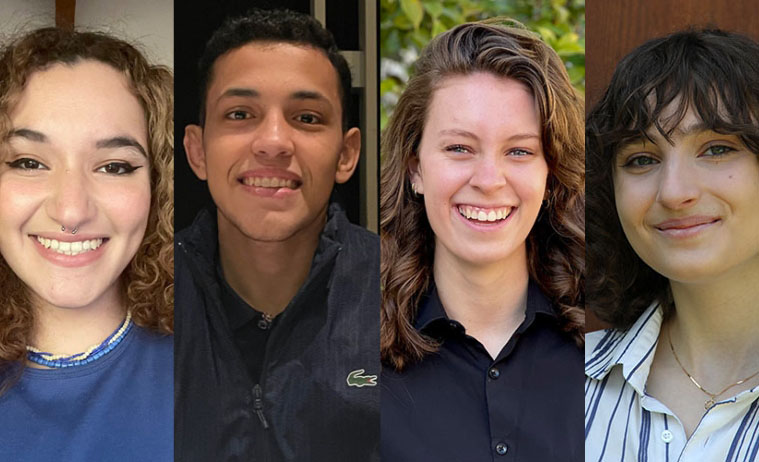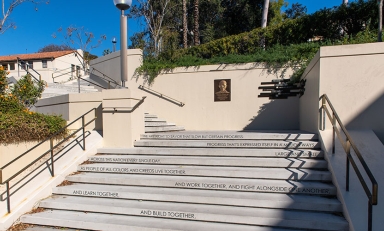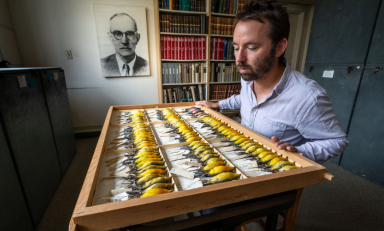
Four Occidental College students in the fields of chemistry, cognitive science, physics, and geology make up this year’s cohort of Science Scholars. They have been presented research grants funded by the Fletcher Jones Foundation.
The scholars selected for this honor are Mario Alvarado ’25, a chemistry major; Lily Gebhart ’25, a cognitive science and mathematics major; Zelie Goldberg Little ’25, a physics and Media Arts & Culture (MAC) major; and Maya Porcelli ’25, a geology major with a concentration in environmental science. Three of this year’s awardees participated in the Research Early Access Program (REAP), which provides rising sophomore students with access to programs, talks, and faculty-mentored research opportunities in biology, biochemistry, chemistry, geology, physics, and psychology.
Each Science Scholar receives $15,000 for research conducted during the spring semester of their junior year, the summer between their junior and senior years, and both semesters of their senior year.
The finalists interviewed with a faculty committee that included Margaret Rusmore, Michael G. Gibby ’68 and Barbara J. Gibby ’68 Professor of Science and professor of geology; Assistant Professor of Cognitive Science Stephanie Nelli; Professor of Physics Janet Scheel; Resident Associate Professor of Chemistry Douglas Duquette; and Professor of Philosophy Clair Morrissey, as well as President Harry J. Elam, Jr.
Alvarado is working with Assistant Professor of Chemistry Raul Navarro on a project titled “Development of a Palladium-Catalyzed Decarboxylative Cyclopropanation of Benzylic Nucleophiles.” Alvarado’s research will build on previous work done in Navarro’s lab, which has already developed a chemical process—palladium-catalyzed decarboxylative allylation—to access molecules known to exhibit useful biological properties. During the course of this previous synthesization, lab researchers discovered that these chemical reactions facilitated the formation of cyclopropanes, which have shown promise in pharmaceutical drug development.
“There is merit to developing this chemistry further, because it can increase our access to bioactive and medicinally relevant compounds,” Alvarado says. “Ultimately, it will lay the foundation to establish more robust tools that allow chemists to create cyclopropane building blocks.”
Working with Associate Professor of Computer Science and Cognitive Science Justin Li, Gebhart will pursue a project called “Integrated Mechanisms for Long-Term Memory Retrieval,” working to integrate multiple existing and proposed mechanisms for human memory retrieval into a single integrated mechanism to improve both the current understanding of human memory and the operations of artificial intelligence models. Cognitive blending—combining multiple computational mechanisms that represent human memory structure—has previously been proposed, but never implemented.
“An important issue in developing these models is determining how information is transferred from long-term memory to the conscious mind, or working memory,” Gebhart explains. “Intuitively, in human memory, all of these mechanisms are used in conjunction, suggesting that combining these mechanisms will increase the accuracy of long-term memory retrieval.”
Goldberg Little will work with Assistant Professor of Physics Sabrina Stierwalt to comprehensively search for dwarf galaxies, or galaxies that range from one thousand to several billion stars—much smaller, in comparison, than the Milky Way’s multiple billions of stars. In order to obtain focused optical telescope observations of the galaxies in each group, Goldberg Little will apply for time working with the telescope at the International Gemini Observatory in Hilo, HI.
“My research on dwarf galaxy groups makes me feel like a galactic historian, documenting groups of small galaxies over space and time, telling the full story of their cosmic dance,” Goldberg Little says. “Like a historian, I must collect and cross-reference data from a variety of sources to guarantee that my story is consistent.”
Porcelli is studying alpine glacier response to abrupt climate change during the Late Glacial, a geological period between the Glacial and the Holocene. Working with Associate Professor of Geology Darren Larsen, Porcelli will focus on Delta Lake, a glacial lake located below the Teton Glacier in Grand Teton National Park, Wyoming. Porcelli will examine the lake’s sediment core, which preserves and provides a unique record of climate history between the end of the Last Ice Age, 15,000 years ago, and the present day.
“Alpine glaciers are especially sensitive to these changes due to their small size,” Porcelli explains. “As a result, the history of alpine glaciers can reveal much about past temperature and precipitation trends. The insights I gather from this research project will be used to predict how alpine glaciers in the western United States will react to current warming trends.”



